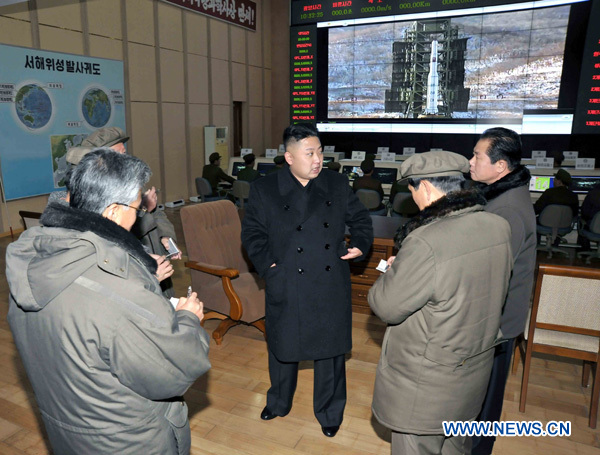DPRK could have US within missile range
 0 Comment(s)
0 Comment(s) Print
Print E-mail China.org.cn, December 24, 2012
E-mail China.org.cn, December 24, 2012
The Democratic People's Republic of Korea (DPRK)'s rocket launch this month showed it has likely developed technology, long suspected in the West, to fire a warhead more than 10,000 kilometers, Republic of Korea military officials said on Sunday, putting the United States' West Coast in range.
|
Photo released by Korean Central News Agency (KCNA) on Dec. 16, 2012 shows Kim Jong Un (C), top leader of the Democratic People's Republic of Korea (DPRK), congratulate recently on scientific workers of the second Kwangmyongsong-3 satellite launch project at Sohae Space Center in Cholsan County, North Phyongan Province, DPRK. |
DPRK said the Dec 12 launch put a weather satellite in orbit but critics say it was aimed at nurturing the kind of technology needed to mount a nuclear warhead on a long-range missile.
DPRK is banned from testing missiles or nuclear technology under UN sanctions imposed after its 2006 and 2009 nuclear weapons tests and the UN Security Council condemned the launch.
ROK retrieved and analyzed parts of the first-stage rocket that dropped in the waters off its west coast.
"As a result of analyzing the material of Unha-3 (DPRK's rocket), we judged Pyongyang had secured a range of more than 10,000 km in case the warhead is 500-600 kg," an ROK Defense Ministry official said.
DPRK's previous missile tests ended in failure.
DPRK, which denounces the US as the mother of all warmongers on an almost daily basis, has spent decades and it's scarce resources to try to develop technology capable of striking targets as far away as the US and it is also working to build a nuclear arsenal, according to Reuters.
But experts believe the DPRK is still years away from mastering the technology needed to miniaturize a nuclear bomb to mount on a missile.
ROK defense officials also said there was no confirmation whether the DPRK had the re-entry technology needed for a payload to survive the heat and vibration without disintegrating.
Despite international condemnation, the launch this month was seen as a major boost domestically to the credibility of the DPRK's young leader, Kim Jong-un, who took over power from his father who died last year.
Apparently encouraged by the euphoria, he called for the development and launching of "a variety of more working satellites" and "carrier rockets of bigger capacity" at a banquet in Pyongyang on Friday which he hosted for those who contributed to the lift-off, according to DPRK's state media.






